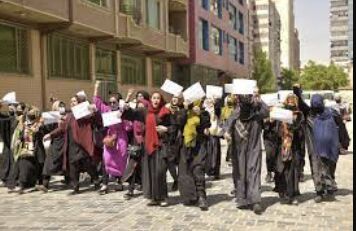Taliban's Gender Apartheid: Women Banned from Popular Afghan National Park, Sparking Outrage and International Condemnation
The Taliban government in Afghanistan has banned women from visiting the popular Band-e-Amir national park, citing improper Islamic dress. Human rights organizations have condemned the move as another infringement on women's freedoms. The closure highlights the strict interpretation of Islam by the Taliban and its marginalization of women. The United Nations has labeled the Taliban's laws as gender apartheid. The ban has sparked outrage, with women sharing memories of the park on social media. The international community is called upon to condemn these oppressive measures and support women in Afghanistan.
In a disturbing move that further restricts the rights and freedoms of women in Afghanistan, the Taliban government has banned women from visiting one of the country's most popular national parks, Band-e-Amir. The park, located 175 kilometers west of Kabul in the Bamyan province, is renowned for its stunning blue lakes and picturesque cliffs, making it a favorite destination for domestic tourists. The ban on women visiting the park was justified by the morality ministry of the Taliban government, who claimed that female visitors were not adhering to the proper Islamic dress code. The decision has been met with condemnation from human rights organizations, who see it as yet another attempt to deprive women of their basic freedoms.
Heather Barr, the Associate Women's Rights Director at Human Rights Watch, called the ban "cruel in a very intentional way." She highlighted the fact that the Taliban not only deprives women of education, employment, and freedom of movement but now also seeks to deny them access to public spaces, including parks and sports facilities. The Minister for the Promotion of Virtue and Prevention of Vice, Mohammad Khalid Hanafi, defended the ban, stating that women were not wearing hijabs properly and that action needed to be taken to enforce compliance.
According to ministry spokesperson Akef Muhajir, local religious leaders requested the closure due to women from outside the province not observing the hijab dress code. While other national parks in Afghanistan remain open to all, the closure of Band-e-Amir to women highlights the Taliban government's strict interpretation of Islam, which has resulted in the marginalization and oppression of women. The United Nations has labeled the laws imposed by the Taliban as gender apartheid, as they disproportionately affect women. Richard Bennett, the UN Special Rapporteur on human rights in Afghanistan, questioned the necessity of this restriction on social media, asking why it was deemed necessary to comply with Sharia and Afghan culture.
Women in Afghanistan have been subjected to numerous restrictions under the Taliban government, including being banned from attending high school and university, visiting parks and gyms, and even working for international organizations or NGOs. Thousands of women have been dismissed from government jobs or paid to stay at home, further limiting their autonomy and economic opportunities. The ban on women visiting Band-e-Amir has sparked outrage and led to an outpouring of support on social media, with women sharing pictures of past visits to the park and expressing hope for a future where they can once again enjoy its natural beauty.
As the walls continue to close in on women in Afghanistan, depriving them of their rights and confining them to their homes, the international community must stand with them and condemn these oppressive measures. The Taliban government must be held accountable for its systematic violation of women's rights and for its attempt to erase them from public life.




